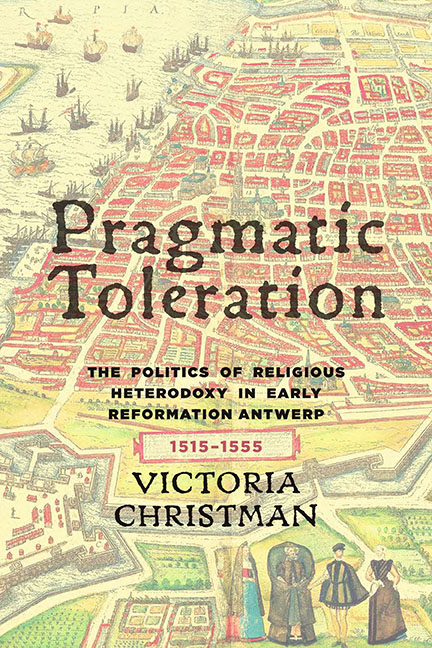Book contents
- Frontmatter
- Dedication
- Epigraph
- Contents
- Acknowledgments
- Introduction
- 1 The Lay of the Land: Government and Law in Brabant
- 2 Undercover: The Claes vander Elst Conventicle
- 3 Pragmatic Intolerance: Antwerp's Anabaptists
- 4 People of the Book: Heterodox Printers and Publishers in Antwerp
- 5 Between Stage and Scaffold: Rederijker Trials in Antwerp
- 6 Trade in Tolerance: The Portuguese New Christians in Antwerp, 1526–50
- Conclusion: Rulers and Religious Renegades
- Appendix 1 Chronology of Antiheresy Legislation in Brabant
- Appendix 2 Answers at Ghent
- Abbreviations
- Notes
- Bibliography
- Index
5 - Between Stage and Scaffold: Rederijker Trials in Antwerp
Published online by Cambridge University Press: 15 March 2018
- Frontmatter
- Dedication
- Epigraph
- Contents
- Acknowledgments
- Introduction
- 1 The Lay of the Land: Government and Law in Brabant
- 2 Undercover: The Claes vander Elst Conventicle
- 3 Pragmatic Intolerance: Antwerp's Anabaptists
- 4 People of the Book: Heterodox Printers and Publishers in Antwerp
- 5 Between Stage and Scaffold: Rederijker Trials in Antwerp
- 6 Trade in Tolerance: The Portuguese New Christians in Antwerp, 1526–50
- Conclusion: Rulers and Religious Renegades
- Appendix 1 Chronology of Antiheresy Legislation in Brabant
- Appendix 2 Answers at Ghent
- Abbreviations
- Notes
- Bibliography
- Index
Summary
Because of its status as a lucrative early modern publishing center, it is perhaps not surprising that bookmen were among those who benefited most from the selective toleration of the city officials of Antwerp. But the municipal authorities extended similarly tolerant treatment to other groups of valuable intellectuals in their city as well. Chief among these were the rederijkers (rhetoricians), a group that was intimately involved in the business of intellectual exchange, functioning as cultural mediators, filtering, assimilating, and transmitting information. They were not, by and large, wealthy, but their occupation endowed them with a certain amount of power, in that they were able to influence the knowledge and opinions of their fellow burghers.
As we shall see in the cases discussed below, in their roles as pedagogues and entertainers, the rederijkers trod an often dangerous line between controversy and heterodoxy. Although several individual rederijkers and many of the dramatic pieces they produced came under intense scrutiny in the city of Antwerp, the city council managed to extend to the rederijkers a form of selective pragmatic toleration similar to that with which they treated their bookmen and bookwomen. As was the case with the publishers, the councilors were successful in protecting even the most controversial of their rederijker inhabitants, with only two notable exceptions. In both of their cases, as in the case of the publisher Jacob van Liesvelt, the harshness of their sentences appears to have emanated not from the Antwerp bench but from the court of the emperor and his queen-regent.
Drawn mostly from the middle class, rederijkers performed a largely didactic function. They were educated, literate burghers, who sought to hone their individual skills of argumentation and literary style, but who also saw themselves as educators, examples of moral and civic virtue in their communities. Groups of urban rederijkers formed chambers of rhetoric (rederijkerskamers), which closely resembled amateur guilds or confraternities, to which members paid yearly dues in addition to extraordinary fees to fund special events. These literary clubs met regularly to discuss new compositions, stage plays, and plan community-wide performances. Although most rederijkers composed literary works, each chamber had its own factor (facteur), the official playwright of the group, who was responsible for producing pieces for public consumption and received a salary for his work.
- Type
- Chapter
- Information
- Pragmatic TolerationThe Politics of Religious Heterodoxy in Early Reformation Antwerp, 1515–1555, pp. 87 - 106Publisher: Boydell & BrewerPrint publication year: 2015

